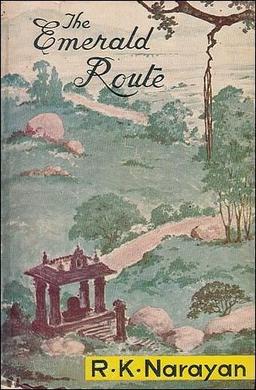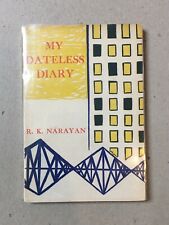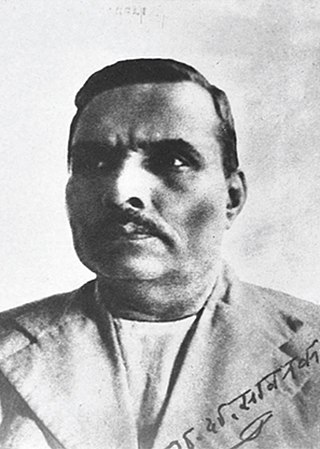
Literary criticism is the study, evaluation, and interpretation of literature. Modern literary criticism is often influenced by literary theory, which is the philosophical discussion of literature's goals and methods. Though the two activities are closely related, literary critics are not always, and have not always been, theorists.

Rasipuram Krishnaswami Iyer Narayanaswami was an Indian writer and novelist known for his work set in the fictional South Indian town of Malgudi. He was a leading author of early Indian literature in English along with Mulk Raj Anand and Raja Rao.
Confessional poetry or "Confessionalism" is a style of poetry that emerged in the United States during the late 1950s and early 1960s. It is sometimes classified as a form of Postmodernism. It has been described as poetry of the personal or "I", focusing on extreme moments of individual experience, the psyche, and personal trauma, including previously and occasionally still taboo matters such as mental illness, sexuality, and suicide, often set in relation to broader social themes.

Mulk Raj Anand was an Indian writer in English, recognised for his depiction of the lives of the poorer castes in traditional Indian society. One of the pioneers of Indo-Anglian fiction, he, together with R. K. Narayan, Ahmad Ali and Raja Rao, was one of the first India-based writers in English to gain an International readership. Anand is admired for his novels and short stories, which have acquired the status of classics of modern Indian English literature; they are noted for their perceptive insight into the lives of the oppressed and for their analysis of impoverishment, exploitation and misfortune. He became known for his protest novel Untouchable (1935), followed by other works on the Indian poor such as Coolie (1936) and Two Leaves and a Bud (1937). He is also noted for being among the first writers to incorporate Punjabi and Hindustani idioms into English, and was a recipient of the civilian honour of the Padma Bhushan.

Rasipuram Krishnaswami Laxman was an Indian cartoonist, illustrator, and humorist. He is best known for his creation The Common Man and for his daily cartoon strip, You Said It in The Times of India, which started in 1951.

Indian English literature (IEL), also referred to as Indian Writing in English (IWE), is the body of work by writers in India who write in the English language but whose native or co-native language could be one of the numerous languages of India. Its early history began with the works of Henry Louis Vivian Derozio and Michael Madhusudan Dutt followed by Rabindranath Tagore and Sri Aurobindo. R. K. Narayan, Mulk Raj Anand and Raja Rao contributed to the growth and popularity of Indian English fiction in the 1930s. It is also associated, in some cases, with the works of members of the Indian diaspora who subsequently compose works in English.

Dr. K. Ayyappa Paniker, sometimes spelt "Ayyappa Panicker", was a Malayalam poet, literary critic, and an academic and a scholar in modern and post-modern literary theories as well as ancient Indian aesthetics and literary traditions. He was one of the pioneers of modernism in Malayalam poetry, where his seminal works like Kurukshethram (1960), is considered a turning point in Malayalam poetry. Many of Ayyappa Paniker's poems and his several essays were an important influence on later generations of Malayalam writers.

Landfall is New Zealand's oldest extant literary magazine. The magazine is published biannually by Otago University Press. As of 2020, it consists of a paperback publication of about 200 pages. The website Landfall Review Online also publishes new literary reviews monthly. The magazine features new fiction and poetry, biographical and critical essays, cultural commentary, and reviews of books, art, film, drama, and dance.

Dwijendra Narayan Jha was an Indian historian who studied and wrote on ancient and medieval India He was a professor of history at Delhi University and a member of the Indian Council of Historical Research. Some of his books include Ancient India: In Historical Outline (1997), The Myth of the Holy Cow (2001), and Early India: A Concise History (2004). Through his works he argued against the communal distortions of history including challenging popular beliefs of the sanctity of cow and Indian beef eating tradition.

Suresh Hariprasad Joshi was an Indian novelist, short-story writer, literary critic, poet, translator, editor and academic in the Gujarati language. Along with his teaching career, he led the modernist movement in Gujarati literature. He was prolific writer and he transformed the field of literary criticism.

The Ramayana is a mythological book by R. K. Narayan. It was first published by Chatto and Windus, London in 1972. The book is a shortened, prose adaptation of the Tamil Kamba Ramayanam. In 1938, Narayan made a promise to his dying uncle that he would translate the Kamba Ramayana to English, however, he did not think about this promise until 1968 when he began work on this effort. He later wrote The Mahabharata, published in 1978.

The Emerald Route is a travelogue by R. K. Narayan. It was published by Indian Thought Publications in 1980. It is a pseudo-travel guide for Karnataka, India. The book was commissioned by the Government of Karnataka, and the initial non-commercial version was published in 1977 as part of a government publication. The book is focused on local history, culture and heritage, and does not exhibit much of Narayan's characteristic personal narrative.

My Dateless Diary is a collection of autobiographical essays by R. K. Narayan published in 1960. The book was the output of a daily journal that he maintained during his visit to the United States on a Rockefeller Fellowship in 1956. While on this visit, Narayan also completed The Guide, the writing of which is covered in this book. The book is focused on Narayan's interactions with the American people and the people themselves. The book also highlights Narayan's view of the west, his appreciation and admiration in general, but subtle disapproval of specific aspects while making it known that there isn't much of a gap between his values and those he has come across. The book offers insights into both, the author and his subjects.

Next Sunday is a collection of weekly essays by R. K. Narayan published in 1960. The book provides insights into Narayan's writings and perspectives and the protagonists of his works - the middle class common man. The book also includes his reflections on the themes of and actions in his novels and short stories.

A Writer's Nightmare is a collection of essays by R. K. Narayan published in 1988 by Penguin Books. The essays included in the book are about topics as diverse as the caste system, love, Nobel Prize winners and monkeys; the book provides readers a unique view of Indian life. The essays were written at various points between 1958 and 1988; the book includes a significant essay, Misguided Guide, expressing Narayan's displeasure with the film Guide, based on his book The Guide.

A Horse and Two Goats and Other Stories is a collection of short stories by R. K. Narayan, published in 1970 by The Bodley Head. The book is illustrated by R. K. Laxman, Narayan's brother, and includes five stories. The title story is a sly narrative of a business transaction between an American tourist and an Indian goat-herder as Muni, the result of an inability to communicate with each other.
Dinanath Gopal Tendulkar (1909–1972) was an Indian writer and documentary film maker. He is most well known as the author of an eight-volume biography of Mahatma Gandhi, titled Mahatma: Life of Mohandas Karamchand Gandhi. He was also a close associate of Vithalbhai Jhaveri and collaborated for the documentary film, Mahatma: Life of Gandhi, 1869–1948. He died on Monday, June 12, 1972.
Mangesh Vitthal Rajadhyaksha was a Marathi writer and critic. He studied at Elphinstone College in Mumbai, where he won the prestigious Wordsworth Prize for the best student in English literature.

Ganesh Dāmodar Sāvarkar, also called Babarao Savarkar, was an Indian politician, activist, nationalist, and founder of the Abhinav Bharat Society.
Gautam Chand Sharma 'Vyathit', also known as Gautam Sharma Vyathit or simply Gautam Vyathit, is a folklorist, playwright, and poet from Himachal Pradesh, India. He is noted for his literary works in Dogri and Hindi, as well as for his various efforts to preserve and nurture the endangered folk arts of Himachal Pradesh, especially those of the Kangra region. Vyathit was the joint recipient of the 2007 Sahitya Akademi Award for his contributions to Himachali languages and literature. 'Vyathit', Gautam Sharma's pen-name in Hindi, means 'pained', or 'distressed'.
















